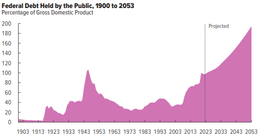
US Federal Debt Held By Public as of Feb. 2023.
(Image by Wikipedia (commons.wikimedia.org), Author: Congressional Budget Office) Details Source DMCA
"House Democrats," CBS News reports, "have taken their first procedural steps to try to force a House vote on a clean debt ceiling increase." Absent such an increase, US Treasury Secretary Janet Yellen predicts the government will reach the end of its ability to borrow money as early as June 1.
What does a "clean" increase mean? It means no politician has to give up anything. Nobody on Capitol Hill or at 1600 Pennsylvania Avenue has to make any sacrifices. Congress just votes to increase the limit on a very special credit card, spent by it but billed to taxpayers (including future unborn generations).
It seems like magic. But, of course, magic isn't real. And there's nothing "clean" about the proposed debt ceiling increase. It's a filthy scam played on Americans by politicians who believe -- or at least hope -- they'll be retired or dead before the winds of reality blow down the house of cards they're building.
And the silliest part is that it isn't even remotely necessary -- not even if the standard is "spend enough to continue having insanely large, burdensome, and intrusive government."
"Clean debt ceiling raise" advocates insist that opposition to a rubber stamp on the government continuing to grow its spending faster than its revenues every year, forever, and continuing to borrow larger amounts of money every year than the year before, forever, is some kind of Dickensian scheme to steal grandma's gruel, chain little Jimmy to a machine in a factory, and reduce the size and equipment of the US armed forces to that of a local Cub Scout troop.
But let's look at some numbers.
According to the Office of Management and Budget, the US government took in revenues of about $2.5 trillion and spent about $3.5 trillion in 2019.
Also according to OMB, the US government will take in revenues of about $3.5 trillion and will spend about $4.6 trillion this year.
Why am I leaving out the years in between? Because the COVID-19 pandemic provided at least a fig leaf of "emergency" justification for running large deficits and borrowing lots of money. Now that the pandemic is officially over, it's time to stop playing "emergency" games.
If the US government limited itself to spending THIS year what it spent in 2019, its budget would be balanced.
Not what it spent in 1819.
Not what it spent in 1919.
What it spent four short years ago, when it was still bogged down in the 20-year Afghanistan war and blowing money like a drunken sailor on frippery like Donald Trump's "border wall."
Not that Republicans propose anything as draconian as, you know, spending less than they take in. They just want slight decreases in the acceleration of fiscal stupidity. But that might be a start.




